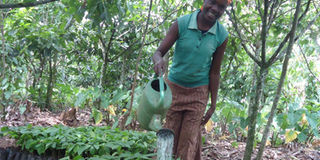Activists challenge Plant Variety Protection law

A farmer waters cocoa seedlings in Kayunga. It is argued that the law on plant variety protection puts smallholder farmers at a disadvantage. PHOTO BY FRED MUZAALE
A group of civil society organisations have challenged the Plant Variety Protection Act by filing a petition to the Constitutional Court, in which they want the law declared null and void.
The law was passed by Parliament on December 20, 2013 and assented to by the President on June 21, last year.
The petitioners include Centre for Health, Human Rights and Development (Cehurd), Food Rights Alliance Uganda, Southern and Eastern African Trade Negotiations Institute (Seatini) and Action Aid Uganda.
Heart of food system
They argue that the Plant Variety Protection Act is unconstitutional because it gives all the produce cultivated by farmers to the owners of the seeds, plants and propagating material which the farmers have used to cultivate that produce.
“The grant of exclusive rights to plant breeders over reproductive material of plant varieties amounts to privatisation of Uganda’s food system and holds common farmers at ransom since the seed is at the heart of the food system in Uganda,” said Mbalangu Gonzaga, the legal officer, Food Rights Alliance Uganda.
Right to choose
The petitioners accuse the Speaker of Parliament, Rebecca Kadaga for not establishing whether there was quorum in Parliament before passing law.
This, they say, denied MPs who represent many farmers the right to choose whether they wanted the Bill to become law or not.
They also accuse the government for not consulting Ugandan citizens when the provisions of the Act were being drafted. This essentially has taken away the farmers’ rights.
‘The Parliament of Uganda has on several occasions including while creating the Marriage and Divorce Bill, 2009 and the National Biotechnology and Biosafety Bill 2010 instructed its members to consult their constituents on matters being legislated to ensure individual participation,” Moses Mulumba, the executive director, Cehurd, pointed out.
Hold consultations
However, it is not clear why the MPs did not go back to their constituencies to consult the people on an important Bill that affects their livelihoods.
He added: “We want the Constitutional Court to declare particular sections of the law as unconstitutional but we also want to ensure that Parliament learns that when they are executing their mandate the community has given them to do; they do so on behalf of the communities and as such they have always come back to do the consultations.”
On his part, George Kirabira Kamya, a farmer from Nakaseke District, commented: “What I understand is that the law if put into action, will deny farmers access to their own seed varieties. Despite the breeders putting in efforts, it’s equally important that farmers benefit from the varieties.”
He added that smallholder farmers can rarely afford the varieties and MPs ought to have started with them to have a harmonised position.




